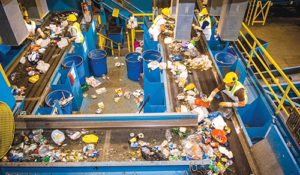The U.S. Environmental Protection Agency (EPA) announced more than $100 million to expand recycling infrastructure and waste management systems across the country, representing EPA’s largest recycling investment in 30 years.
EPA has selected 25 communities to receive grants totaling more than $73 million under the newly created Solid Waste Infrastructure for Recycling funding opportunity. In addition, the agency is making available approximately $32 million for states and territories to improve solid waste management planning, data collection and implementation of plans.
The grants support the implementation of EPA’s National Recycling Strategy to build an economy devoted to keeping materials, products, and services in circulation for as long as possible – what’s known as a “circular economy.”
EPA’s Solid Waste Infrastructure for Recycling Grant Program is also advancing the Justice40 Initiative, which aims to ensure that 40 percent of the overall benefits of certain federal investments flow to disadvantaged communities that are marginalized, underserved, and overburdened by pollution. Approximately $56 million out of the $73 million – or 76 percent – of the total funding for communities will go toward projects that benefit disadvantaged communities.
Solid Waste Infrastructure for Recycling Grants for Communities
The recycling grants for communities will support improvements to waste management systems across the country and will range from $500,000 to $4 million per grant. Selected projects include purchasing new fleets of recycling collection vehicles and bins to provide curbside recycling services for communities currently lacking access; upgrades to material recovery facilities to reduce contamination; enhancements to composting and organics programs and infrastructure; and construction of various types of facilities that improve recycling, composting, and reuse infrastructure for materials such as plastics and food waste.
Solid Waste Infrastructure for Recycling Grants for States and Territories
The recycling grants for states and territories will provide funding to all 56 states, territories and the District of Columbia via grants ranging from $360,000 to $750,000; with the highest grant amounts supporting those states and territories that need it the most. These grants represent important steps toward achieving the EPA’s National Recycling Goal and Food Loss and Waste Reduction Goal. Funded activities include improving post-consumer materials management programs through developing or updating solid waste management plans and strengthening data collection efforts.
Additional Background
In the coming months, EPA will announce the selected recipients of the recycling grants for Tribes and intertribal consortia, as well as the recipients of EPA’s new Recycling Education and Outreach grant program.
The Bipartisan Infrastructure Law provides $275 million total from fiscal year 2022 to fiscal year 2026 for grants authorized under the Save Our Seas 2.0 Act – the largest investment in recycling in 30 years. The recycling grants are supplemented with additional funding provided through EPA’s annual appropriations. EPA has selected these entities to receive funding for recycling infrastructure projects and anticipates making all the awards announced once all legal and administrative requirements are satisfied.